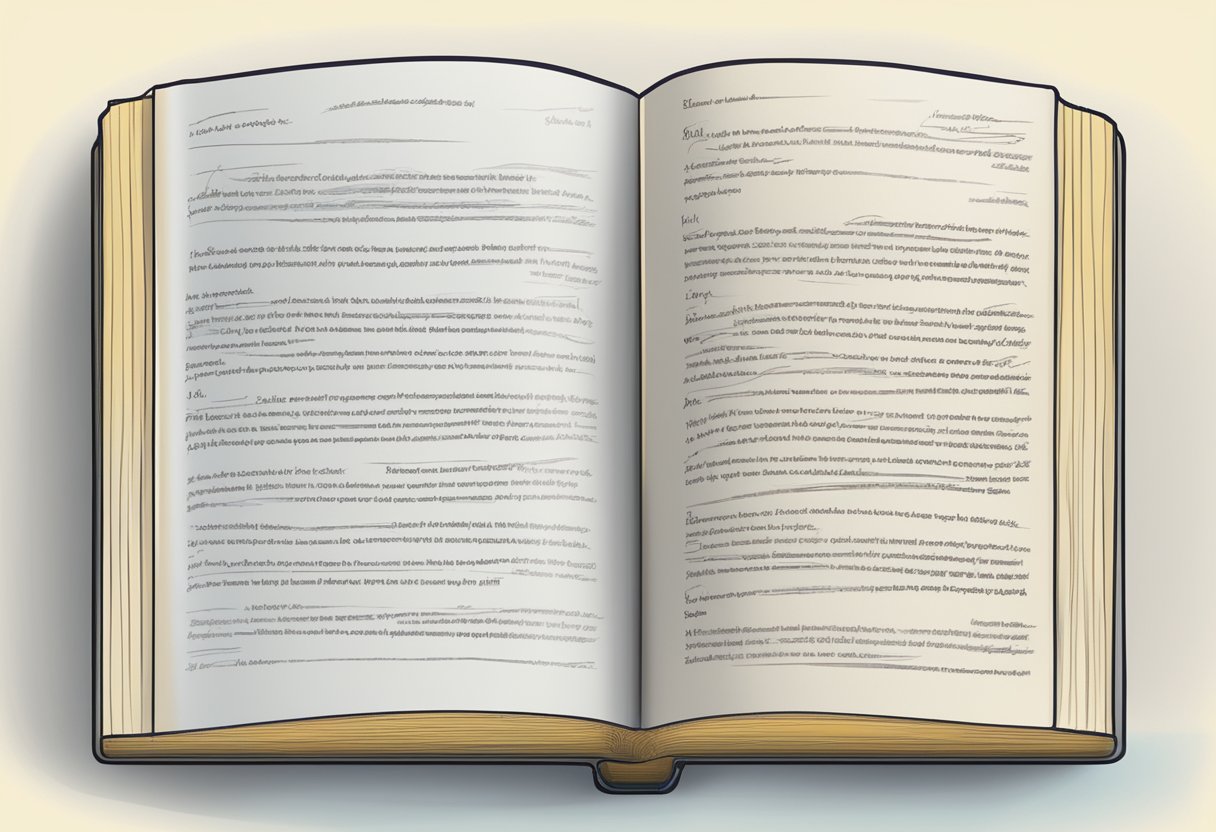Discipline is a recurring theme in the Bible, and it is mentioned numerous times throughout the Old and New Testaments.
The word “discipline” can be found in various forms, including “disciplined,” “disciplines,” and “disciplining.” But just how many times is discipline mentioned in the Bible?

According to various sources, the word “discipline” appears around 60 times in the Bible, from Genesis to Revelation.
However, the exact number of times the word is mentioned may vary depending on the translation.
The Bible uses sentences to convey the idea of training, correcting, and instructing. It is often used in the context of parental, God’s, and self-discipline.
Understanding the concept in the biblical context is crucial for Christians. It helps us to comprehend God’s love, righteousness, and the role of retribution in the Christian life.
In this article, I will analyze the various aspects of discipline in the Bible and its significance for believers.
Understanding Discipline in Biblical Context
Discipline is a concept that is frequently mentioned in the Bible, appearing in various forms such as instruction, correction, and reproof.
In the biblical context, it is not just about punishment for wrongdoing, but it is also about training, instruction, and guidance towards righteousness.
The Bible teaches that discipline is necessary for growth in knowledge and wisdom. Proverbs 12:1 states “Whoever loves discipline loves knowledge, but whoever hates correction is stupid.”
This verse emphasizes the importance of accepting correction and discipline in order to gain knowledge and wisdom.
This term is also closely linked to love. Hebrews 12:6 states that “the Lord disciplines the one he loves, and he chastens everyone he accepts as his son.”
Similarly, it is closely tied to obedience to God’s laws and commands. Deuteronomy 8:5 states “Know then in your heart that as a man disciplines his son, so the Lord your God disciplines you.”
Discipline is not just about punishment, but it is also about self-control. Proverbs 25:28 states “Like a city whose walls are broken through is a person who lacks self-control.”
Discipline in the Old Testament

Proverbs, in particular, contains several verses that emphasize the importance of discipline in raising children.
Proverbs 13:24 states, “Whoever spares the rod hates their children, but the one who loves their children is careful to discipline them.”
Similarly, Proverbs 22:15 says, “Folly is bound up in the heart of a child, but the rod of discipline will drive it far away.”
In addition to Proverbs, other Old Testament books also mention discipline.
Deuteronomy provides guidance on how to discipline children, stating that parents should “teach them diligently” (Deuteronomy 6:7) and “train them up in the way they should go” (Proverbs 22:6).
Job, a book that explores the nature of suffering in the Bible, also touches on the topic of retribution.
Job 5:17 states, “Behold, blessed is the one whom God reproves; therefore despise not the discipline of the Almighty.”
The book of Psalms also contains references to this term. Psalm 94:12 states, “Blessed is the man whom you discipline, O Lord, and whom you teach out of your law.”
Similarly, Psalm 119:67 says, “Before I was afflicted I went astray, but now I keep your word.”
While the methods of discipline may vary, the underlying message is clear: discipline is necessary for growth and development.
Discipline in the New Testament

Here are some of the key passages that discuss discipline in the New Testament:
Hebrews 12:11: This verse talks about how discipline can be painful at the moment, but it yields the peaceful fruit of righteousness for those who have been trained by it.
Ephesians 6:4: This verse instructs fathers not to provoke their children to anger but to bring them up in the discipline and instruction of the Lord.
1 Corinthians 9:27: This verse talks about how the apostle Paul punishes his body and keeps it under control so that he will not be disqualified from preaching the gospel.
Titus 1:8: This verse lists self-control as one of the qualifications for church leaders, along with being hospitable, gentle, and upright.
2 Timothy 1:7: This verse talks about how God has given us a spirit of power, love, and self-discipline, rather than a spirit of fear.
Revelation 3:19: This verse talks about how Jesus rebukes and disciplines those whom he loves, so that they may repent and turn back to him.
As the former writer of Hebrews notes, discipline can be painful at the moment, but it can lead to long-term benefits if we allow ourselves to be trained by it.
In the context of parenting, Ephesians 6:4 reminds us that retribution should be done in a way that is not harsh or abusive, but rather in a way that is consistent with the instruction of the Lord.
In the context of church leadership, Titus 1:8 reminds us that self-control is an important quality for those who are called to lead and serve others.
Overall, the New Testament offers a balanced perspective on discipline, emphasizing the importance of self-control, personal growth, and accountability, while also recognizing the need for grace, forgiveness, and compassion.
As you seek to grow in your own spiritual journey, may you find the wisdom, strength, and discipline that you need to become the person that God has called you to be.
Discipline and God’s Love
Discipline is a topic that is mentioned numerous times in the Bible. As you may know, God is a loving Father who desires the best for His children.
Therefore, He provides instruction, correction, and rebuke to help guide you on the right path.
God’s punishment is not meant to harm you but to help you grow and mature in your faith.
In fact, the book of Hebrews says that discipline is evidence of God’s love for you (Hebrews 12:6).
When you receive punishment from God, it is a sign that He cares about you and wants to see you succeed.
The book of Revelation says that those whom God loves, He rebukes and disciplines (Revelation 3:19).
Through discipline, God teaches you to live a life that is pleasing to Him. As a loving Father, He desires that you live a life of holiness and righteousness.
Therefore, when you receive discipline, it is important to respond with humility and a desire to change.
Discipline and Righteousness
Discipline is a crucial aspect of the Bible, and it is mentioned numerous times throughout the scriptures.
According to various versions, the word “discipline” appears approximately sixty times.
Discipline is often associated with righteousness, which is the state of being morally right or justifiable.
As a follower of God, you are expected to live a righteous life, which entails obeying His laws and doing what is good and just.
The Bible emphasizes the importance of discipline in achieving righteousness. Proverbs 12:1 states “Whoever loves discipline loves knowledge, but whoever hates correction is stupid.”
This verse implies that punishment is necessary for gaining knowledge and wisdom, which are essential for living a righteous life.
God’s laws are the foundation of discipline, and obeying them is crucial for living a righteous life. Deuteronomy 11:1 states, “Love the Lord your God and keep his requirements, his decrees, his laws, and his commands always.” Obeying God’s laws is an act of righteousness, and it demonstrates your love for Him.
However, as humans, we are prone to sin, which is a violation of God’s laws. When we sin, we need to repent and seek forgiveness from God. Hebrews 12:11 states “No discipline seems pleasant at the time, but painful.
Later on, however, it produces a harvest of righteousness and peace for those who have been trained by it.”
Discipline is also essential for upholding justice. Proverbs 13:24 states “Whoever spares the rod hates their children, but the one who loves their children is careful to discipline them.”
It is essential for achieving righteousness, obeying God’s laws, repenting for our sins, and upholding justice.
Discipline and the Christian Life
Discipline is a crucial aspect of the Christian life. It is mentioned numerous times in the Bible, emphasizing its significance.
As a Christian, you are called to live a life of discipline, which involves training yourself in godliness and living a life that honors and respects God.
The Bible teaches that discipline is necessary for spiritual growth. Proverbs 3:11-12 states that God disciplines those He loves, just as a father disciplines his son.
This means that discipline is not punishment, but rather a way to guide and correct us when we stray from God’s path.
Self-discipline is also important in the Christian life. It involves exercising self-control and resisting temptation. 2 Timothy 1:7 reminds us that God has given us a spirit of power, and love, which we must cultivate in our daily lives.
Hebrews 12:11 states that discipline may seem painful at the time, but it yields the peaceful fruit of righteousness to those who have been trained by it.
In addition to self-discipline, we are also called to honor and respect our elders and those in positions of authority.
1 Peter 5:5 instructs us to be humble towards one another and to clothe ourselves in humility towards our leaders.
As Christians, we are also called to discipline ourselves in the truth and godliness. 1 Timothy 4:7-8 reminds us to train ourselves in godliness, which has value in this life and the life to come.
Final Thoughts
The Bible defines discipline as a way to gain knowledge, instruction, and righteousness. It is an act of love from a father to his son, and it is necessary for a good life.
God’s retribution is a way to teach us to obey His law and to repent from our sins. It is a sign of His love and a way to bring us back to Him.
We should not despise His retribution, but rather fear Him and delight in His wisdom.
The book of Proverbs is full of instructions on discipline, including the use of the rod to correct children.
In Hebrews, we learn that discipline may be painful at the moment, but it yields the peaceful fruit of righteousness to those who have been trained by it.
We should not reject God’s retribution but rather accept it with humility and repentance.
As fathers, we should not withhold discipline from our children but rather train them in the instruction of the Lord.
Frequently Asked Questions
How is discipline defined in the Bible?
Discipline in the Bible refers to correction and training. It is a form of punishment intended to correct behavior and promote obedience.
Which Bible characters displayed discipline?
Several Bible characters displayed discipline, including Moses, David, and Paul. Moses punished the Israelites for their disobedience to God.
David sentenced his son Absalom for his rebellion. Paul punished the Corinthian church for their sinful behavior.
What does the Bible say about disciplining a child with a rod?
Proverbs 13:24 says, “Whoever spares the rod hates their children, but the one who loves their children is careful to discipline them.”
This verse suggests that physical discipline, such as spanking, can be an appropriate form of discipline for children.
